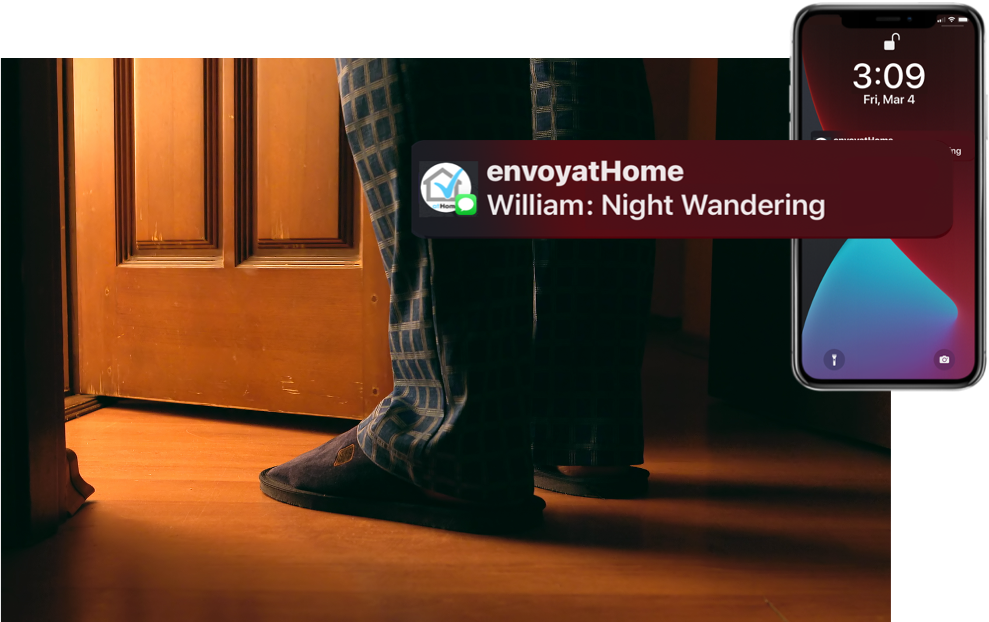The Pros and Cons of 4 Technologies to Help Care for Aging Parents

Caring for an aging parent is a challenging role that can take a toll on even the most dedicated and loving families. The responsibility to ensure the safety and well-being of a parent with a dementia diagnosis or other health concerns can be even more overwhelming. As a family caregiver, you want to provide your parents with the best possible care. But the financial strain and constant worry can affect your own health and well-being. Let’s explore the pros and cons of four popular care tools.
Video Cameras
In today’s digital age, video cameras have emerged as a cheap and enticing tool for monitoring our aging parents. Generally affordable and relatively easy to deploy, they promise a watchful eye on the resident inside a home.
First and foremost, most people agree that cameras should never intrude upon the sanctity of private spaces such as bedrooms and bathrooms. The problem is, according to the CDC, it’s in these very rooms that accidents are most likely to occur.
Equally pressing is the issue of time. Unless a camera is monitored continuously — an impractical expectation for most family caregivers — the chance of missing an emergency as it unfolds is high.
In sum, while video cameras may offer the illusion of peace of mind, they remain a partial solution at best. Their usefulness must be balanced with ethical, practical, and security-related issues.
Wearable Emergency Buttons
Wearable emergency buttons are advertised with promises of safety and independence for our aging loved ones. However, the practicality of these devices demands scrutiny by stressed caregivers.
Will my elderly parent consistently wear their wearable? Wearables only work when your loved one wears them! The truth is, an elderly parent may not have the cognitive capability to consistently manage their device whether it be locating, charging, remembering, and actually choosing to wear their device all the time. If a loved one cannot be trusted to take their meds or remember an appointment, managing a wearable 24 x 7 may be too much to ask.
Will my loved one be capable in an emergency situation even when they’re injured, disoriented, afraid, or under extreme duress? Quick decision-making in an emergency is far from straightforward. For a parent with cognitive decline or memory issues, assessing the severity of a situation is a risky proposition. Even if an older adult under duress wants to push the button, the device must be within reach, charged, and accessible.
As a caregiver, will I be less stressed if I shift my responsibility for emergency decision making to my loved one and their button? While emergency buttons aim to alleviate caregiver stress, they inadvertently introduce a layer of risk because they rely on the very individuals we aim to protect to make critical decisions in their most vulnerable moments.
Fall Monitors
Designed to alert caregivers after an older adult has experienced a fall, fall monitors can be a helpful tool. Yet, while they address an important caregiver concern, their capability is singularly focused on reporting a potential fall. This is a reactive rather than preventive solution that for some provides too little help too late.
While these devices indeed encourage a response post-incident, they do not offer a solution to prevent falls from occurring in the first place. Consequently, caregivers are stressed with blind spots, questioning if the investment genuinely aligns with the ultimate goal of comprehensive safety for aging parents.
Home Monitoring Systems
Under the pressure of unrelenting caregiver stress, the quest for a solution that offers both peace of mind and affordability has been paramount. The industry leader of solutions FOR CAREGIVERS, envoyatHome, has pioneered an affordable home monitoring system designed specifically for caregivers of older adults who age in place. This innovative system stands out as a beacon of hope for those managing the care of a parent with dementia or other vulnerabilities.
The benefits of employing envoyatHome’s system are multifold, addressing the crucial needs of both caregivers and their elderly loved ones. It’s not just a fall monitor; it’s a comprehensive caregiving assistant, offering real-time alerts when a loved one may be at risk and behavioral insights that you can share with doctors to proactively ensure your loved one’s safety and well-being. This level of oversight and care, delivered to a caregiver’s mobile phone, has garnered high praise from family caregivers, clinical professionals, and geriatric case managers:
enovyatHome home monitoring system uses no cameras, no wearables, no buttons, and unlike a fall monitor, comprehensively covers a loved one’s entire home for only pennies per hour. The system requires no engagement from the older adult, making it an ideal solution for caregivers with reluctant parents or a newly diagnosed parent with dementia.
